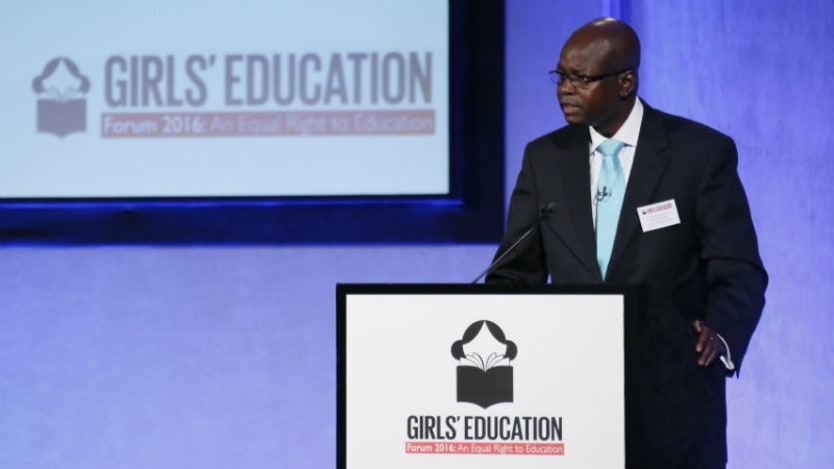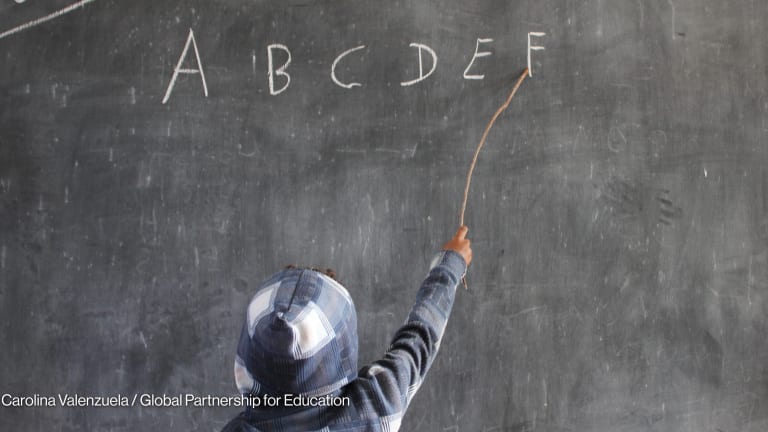Amid crisis, South Sudan's education chief sets out an ambitious agenda

LONDON — Years of conflict, famine, and political upheaval have taken their toll on South Sudan’s education system. Many schools have been destroyed by armed groups or stand empty because children and teachers are too scared to attend; while some parents are no longer able to pay for uniforms and books as they deal with unemployment and the effects of a chronically devalued currency.
The United Nations estimates that more than half of the country’s 1.8 million school-aged children are currently out of school. Huge numbers remain internally displaced in U.N. camps. Literacy rates are among the lowest in the world.
The government says an additional 6,000 schools need to be built, but this year allocated only 4 percent of the budget to education. Now, thousands of children who fled as refugees are starting to return to the country, increasing the burden on the system.
South Sudan’s education minister, Deng Deng Hoc Yai, wants to transform the country’s fledgling education system to deliver high quality, equitable education for all, while also creating “good citizens” with employable skills. Learning can be a “powerful weapon” for achieving peace and security, he said.
See more related topics:
► To gain access in South Sudan, humanitarians walk a political tightrope
► Inside the battle for replenishment at the Global Partnership for Education
► Opinion: Liberia’s battle to educate our next generation
► Opinion: The UK needs to take a leading role in global education. Here's how.
► Stop blaming teachers for education woes, says UNESCO report
But he faces an uphill battle. Most donor funding is tied up with the humanitarian crises caused by the country’s ongoing civil war; the South Sudanese government itself has so far failed to prioritize education; and many of the NGOs that left the country when conflict erupted in 2013 are yet to return. Those that remain face major difficulties, as Devex has reported, and the country is ranked as the world's most dangerous place to be an aid worker, with at least 95 killed since the conflict began.
Against this daunting backdrop, Yai sat down with Devex during last week’s World Education Forum in London to talk about his ambitious agenda, and how he plans to deliver it.
Education to catalyze peace and security
Not always a given among education ministers, Yai has considerable teaching experience, and a master’s degree in curriculum development of English as a second language from the United Kingdom, he told Devex. He was in the middle of a second master’s when he was “called back” to South Sudan to work in the government, he said.
“In this profession you need to actually know what happens in the classroom,” he said. “You need to have the helicopter view and see the whole system, you know how the pieces come together.”
But considering war-torn South Sudan’s unique challenges, it makes sense that alongside the drive for quality education, one of Yai’s key messages is around the role education can play in promoting peace and security. This has informed the reforms he helped set in motion, including a new education act in 2012 and the country’s first national curriculum, launched in 2015 with the support of the Global Partnership for Education, which includes a focus on peace, the environment, equity, and inclusion both inside and outside the classroom.
“The reforms we did … [aim] to use education as a catalyst for promoting peace and security,” Yai explained, adding that “education is a powerful weapon.”
Inspired partly by his time in the U.K., the minister has also introduced “citizenship” as a compulsory subject in secondary schools, with the aim of ensuring “that young people who complete school become good citizens” which means “understanding their constitution,” and also knowing “the values, customs, and traditions of the people and so in understanding their culture they will not be against [it],” he said.
Linked to this, younger children will also now be taught in local languages up to a certain level. Not only do studies show this improves learning but it also helps recognize the country’s diversity — it is home to more than 60 different tribes — Yai said.
Outside of the classroom, schools might host “peace clubs,” where children perform poetry, drama, singing, and dancing, all designed to have the effect of “turning a school into a zone of peace,” in which “acts of violence are prevented, children learn in a peaceful environment and they support each other,” the minister explained.
In addition, preparing students for the workforce is a key priority for Yai, which he sees as contributing to peace as well as to the economy. Technical and Vocational Education and Training, or TVET, is central to achieving this, he said, adding that he is keen to encourage and emulate the effective TVET programs that have been led in the country by NGOs such as Save the Children.
Barriers to success
The impact of the reforms is limited, though, in part by the fact that such a low proportion of children are in school or learning. According to figures from UNESCO, just 14 percent of children completed their primary school education in 2015, and only 3 percent finished secondary school. Africa ELI, a United States-based nonprofit focused on secondary level education in South Sudan, points to barriers for girls’ education including the location and number of schools, especially as some journeys to school may be treacherous; environmental dangers, such as a lack of drinking water at some schools; and the quality and availability of teachers.
The majority of teachers have themselves obtained only primary or secondary certificates of education. In response, the ministry has begun shifting teachers around within the government system, moving those with primary certificates to other government jobs and re-allocating those with secondary qualifications to teach the younger students. The hope is this will open up more senior teaching jobs for the country’s university graduates, said Yai.
“This is a significant reform but is only a first step,” he said, adding that “after moving people round we will need to embark on a mass teacher training program to ensure all are equipped to increase their professionalism and the quality of the learning in the schools.”
The minister also said he plans to introduce a U.K.-style school inspection system based on the Office for Standards in Education, Children’s Services and Skills, or OFSTED, model, which inspects and regulates education services. Aware of some of the controversies surrounding this system in the U.K., however, he stressed it would be “without the league table and without naming and shaming.”
“We want to see inspection as a diagnostic exercise whereby you identify strengths and weaknesses in the school leading to development of a school improvement plan, which will then be implemented by the school and the governing body,” he said, adding that the idea is to be a “critical friend” to schools.
Finding the money
Such reforms, however, will need significant additional funding — resources which Yai is not wholly confident will materialize.
On the international donor side, aid to South Sudan largely goes to humanitarian assistance. However, education has been supported by the U.K.’s Department for International Development, specifically through a 60 million British pound ($85 million) six-year program — Girls Education South Sudan — which will finish in 2018. DFID told Devex the program has helped more than 200,000 remain in school thanks to cash assistance, and the agency is considering funding a second phase.
The European Union has also been assisting by topping up teachers’ salaries by $40 per teacher per month, Yai said. The EU has also been funding a pilot promoting education for roving and isolated communities within the country, run by the United Nations Food and Agriculture Organization, as Devex reported.
The Global Partnership for Education allocated the government $36 million in 2012, and has provisionally agreed to provide an additional $30 million subject to the ministry’s proposal getting approval from the GPE board later this year.
However, Yai said a major concern remains around how to convince donors to focus on education as well as disaster relief.
“Because of the conflict … a lot of donors are shifting to humanitarian assistance [but] we are trying to convince them to support education because education is human assistance,” he said, adding, “we treat this as a continuum, it is not a dichotomy.”
Domestic funding for education is also low and has been declining in recent years, according to UNESCO data. However, this could be set to change if the cabinet makes good on its commitment to increase the national education allocation from its current 4 percent to 10 percent for the next financial year.
Yai admitted that actually getting the 10 percent through will be tough, though, given competing pressures on the budget — and considering the education budget has a history of being trimmed.
“We will push … but they [the government] always come back and argue ‘we don’t have enough money,’” he said. “We will see.”
Waves of returning refugees, as well as the 2 million people living in internally displaced camps, add extra complexity, Yai said, suggesting the government’s approach is to be “flexible” and try and educate pupils “wherever they go.”
He is proud that the country recently restarted examinations for students transitioning from primary to secondary school, and that more than 600 students from primary schools in one United Nations Protection of Civilians site were able to sit their exams and are awaiting the results.
But he wants NGOs, many of which left during the conflict, to come back to the country and help with this kind of work. “They can support the government to reach the hard to reach children and citizens,” he said, adding that both his government and NGOs need to invest more in serving these groups.
Search for articles
Most Read
- 1
- 2
- 3
- 4
- 5








